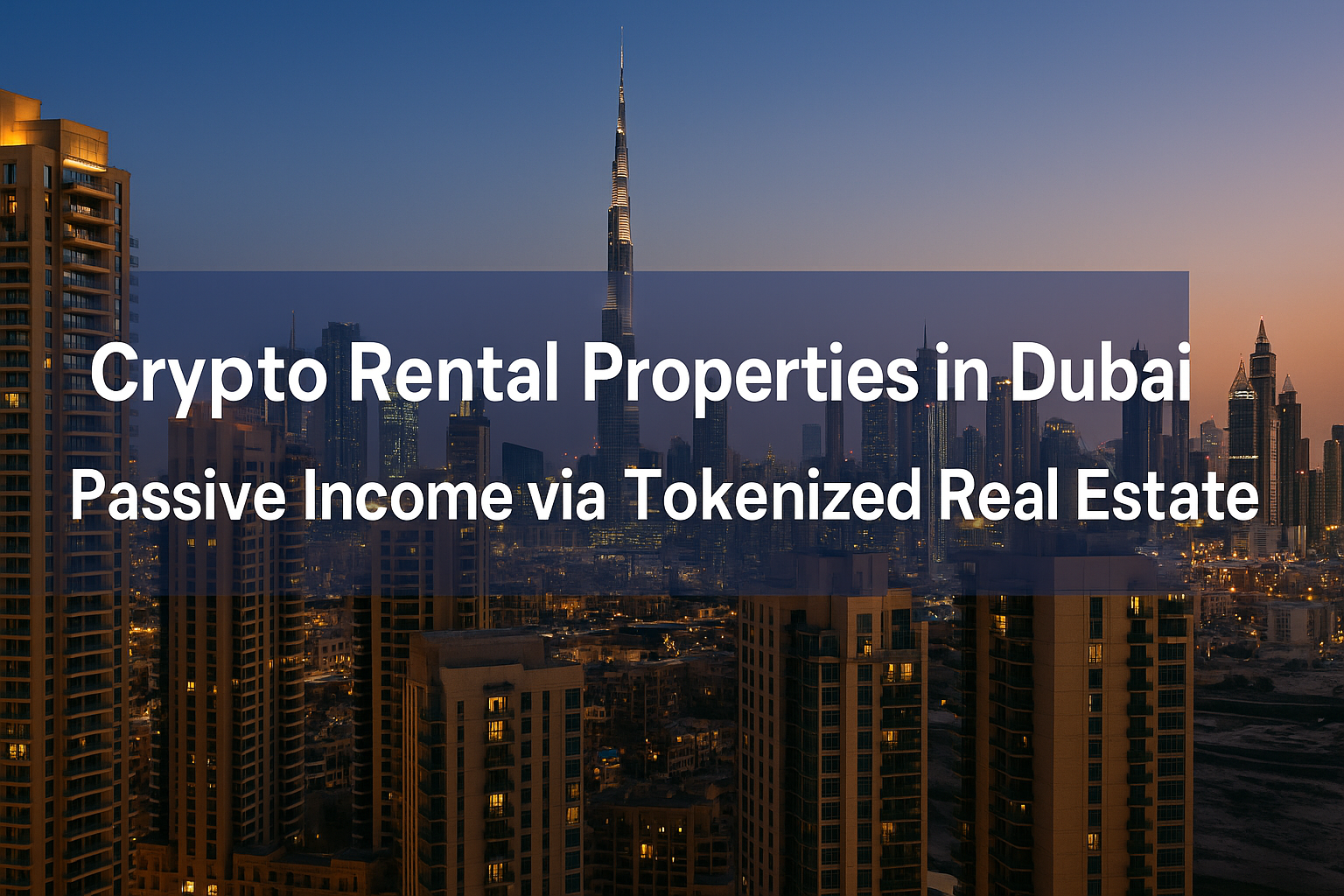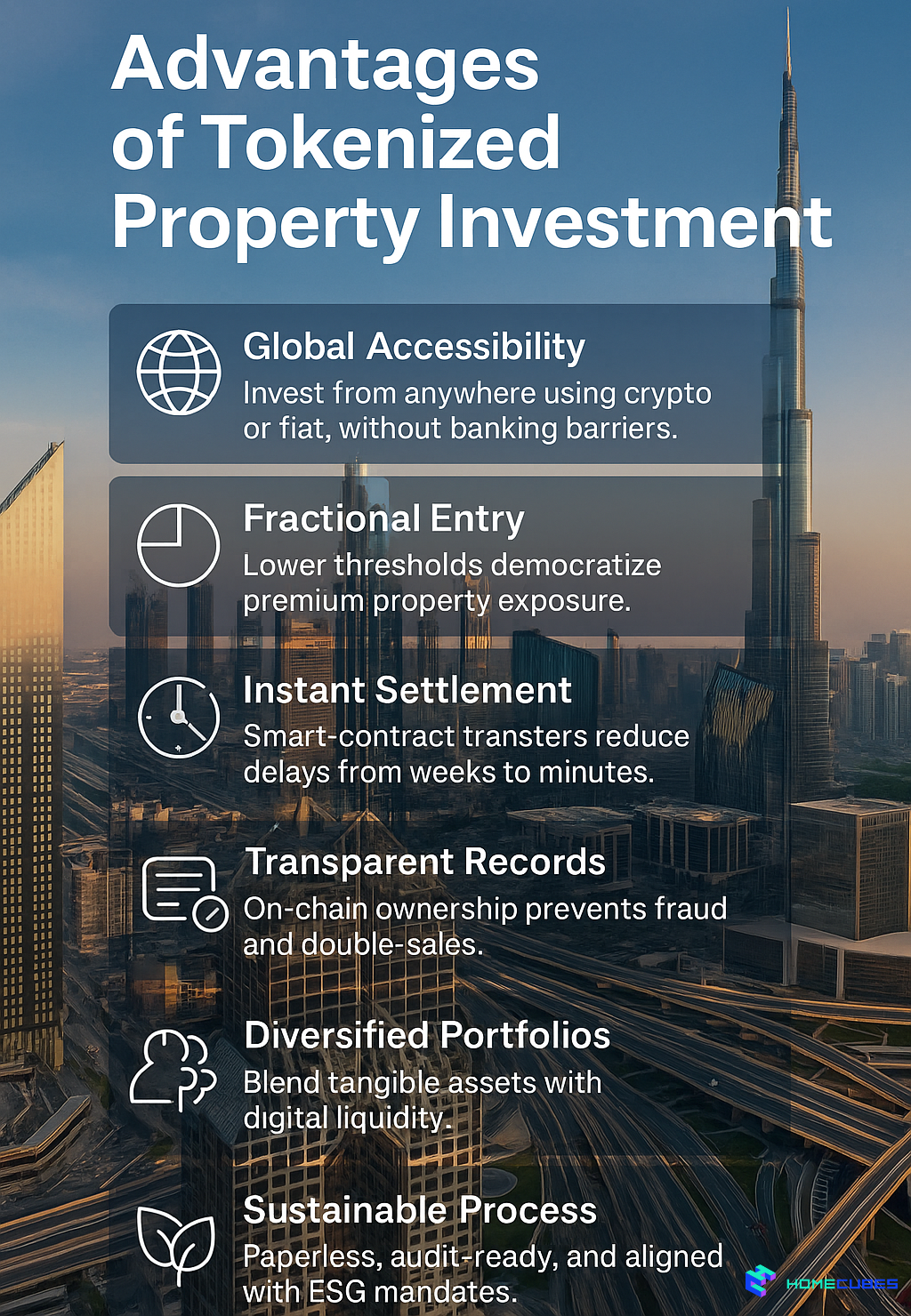

Table of Contents
- Introduction: Dubai’s Next Frontier in Real Estate Investment
- How Crypto Rental Properties Work
- Dubai Market Snapshot 2024–2025: Data & Insights
- Advantages of Tokenized Property Investment
- Legal and Regulatory Landscape in Dubai
- Risk Factors and Mitigation Strategies
- Case Studies: Tokenized Apartments in Action
- Fees and Charges Explained
- Mistakes to Avoid and Best Practices
- Dubai’s Outlook for 2025–2030: The Tokenized Decade
- Frequently Asked Questions (FAQs)
- Final Thoughts
- Homecubes Update
Introduction: Dubai’s Next Frontier in Real Estate Investment
Dubai’s real-estate market has consistently redefined innovation. Today, a new frontier — crypto rental properties — combines blockchain transparency with property-based passive income.
Unlike speculative cryptocurrencies, these assets are tied to real properties recorded and verified through the Dubai Land Department (DLD) Real-Estate Tokenization eService. Rental income is distributed via blockchain smart contracts, and ownership is fractionalized through tokens representing legally registered property rights.
Supporting this transformation, the Virtual Assets Regulatory Authority (VARA) governs digital-asset service providers, ensuring compliance with the UAE’s AML/CTF framework. Together, these initiatives form the regulatory backbone for crypto rental properties passive income Dubai — a model attracting global investors.
🚨 BREAKING: Dubai just launched a $16B tokenized real estate project on XRP Ledger.
Buy property for just $500.
Habibi money is loading. #RWA 🚀 pic.twitter.com/rdYpptVzoj
— Real World Asset Watchlist (@RWAwatchlist_) May 26, 2025
How Crypto Rental Properties Work
Tokenized real estate converts tangible ownership or rental rights into digital tokens. Each token represents a fractional claim on the property’s returns.

- Token Creation: A property valued at AED 5 million may be divided into 5 000 tokens priced at AED 1 000 each, immutably registered on-chain under DLD oversight.
- Smart-Contract Automation: Rental income is automatically distributed to token holders in USDT or USDC, ensuring transparent, instant payouts.
- Liquidity via Secondary Markets: Investors can sell tokens through regulated exchanges or peer-to-peer networks, unlocking liquidity rarely possible in real estate.
- Yield Enhancement: Some licensed platforms integrate DeFi features such as staking or collateralization for additional returns — though investors should balance risk accordingly.
Dubai Market Snapshot 2024–2025: Data & Insights
Dubai’s property and blockchain metrics show parallel momentum:
- Record Sales: The Knight Frank Destination Dubai 2025 Report logged over 92 000 property sales in 2024 — the city’s highest ever — with luxury submarkets like Palm Jumeirah up 30 % YoY.
- Rental Growth: According to CBRE’s UAE Real Estate Market Review Q2 2025, average residential rents rose 21 %, underlining strong yield potential.
- Crypto Adoption: Chainalysis’ 2024 research shows the UAE received over $30B in on-chain value (Jul 2023–Jun 2024), making it MENA’s third-largest crypto economy and placing it within the top ~40 globally by value received; MENA overall is the 7th-largest crypto market worldwide.
- Government Vision: Dubai’s long-term Blockchain Strategy 2030 aims for full on-chain property and government services.
- Accessible Platforms: Start-ups like SmartCrowd, Stake, and Realiste AI already let investors buy fractional property interests starting from AED 500 – 1 000.
These statistics validate Dubai’s position as the world’s testbed for tokenized real-estate adoption.
Advantages of Tokenized Property Investment

- Global Accessibility: Invest from anywhere using crypto or fiat, without banking barriers.
- Fractional Entry: Lower thresholds democratize premium property exposure.
- Instant Settlement: Smart-contract transfers reduce delays from weeks to minutes.
- Transparent Records: On-chain ownership prevents fraud and double-sales.
- Diversified Portfolios: Blend tangible assets with digital liquidity.
- Sustainable Process: Paperless, audit-ready, and aligned with ESG mandates.
Legal and Regulatory Landscape in Dubai
Dubai’s governance model ensures investor confidence:
- The DLD Tokenization eService registers on-chain property ownership.
- RERA oversees landlord-tenant law and escrow management.
- The VARA Rulebooks set out licensing, custody, and exchange obligations for virtual-asset firms.
- The Central Bank of the UAE’s Cabinet Resolution No. 111 of 2022 enforces AML/CTF compliance for fiat–crypto interfaces.
- Free Zones (DIFC & ADGM) provide SPV frameworks for tokenized property ownership and dispute resolution.
Together, these layers guarantee that crypto rental property investments operate under transparent, enforceable regulation.
Risk Factors and Mitigation Strategies
| Risk | Impact | Mitigation |
| Market Volatility | Crypto price swings affect ROI. | Use stablecoin (USDT/USDC) payouts. |
| Liquidity | Limited buyers restrict exits. | Trade via active, licensed exchanges. |
| Smart-Contract Errors | Bugs can freeze payouts. | Demand third-party audits. |
| Operational Costs | Maintenance reduces yield. | Review management contracts. |
| Regulatory Shift | Rules may change. | Stick with DLD-linked, VARA-licensed firms. |
| Custody Risk | Key loss jeopardizes assets. | Store via regulated custodians. |
Case Studies: Tokenized Apartments in Action
1 – Business Bay Studio
- Value: AED 1.2 million
- Tokens: 12 000 (AED 100 each)
- Yield: ≈ 7.5 % gross
- Distribution: Monthly USDT via audited smart contract
- Investors: 200 + from 12 countries
2 – Dubai Marina Luxury Apartment
- Value: AED 3.8 million
- Tokens: 3 800 (AED 1 000 each)
- Yield: 6.8 % net after fees
- Occupancy: 94 % in 2024
- Compliance: Registered under the DLD tokenization eService
These pilots illustrate how regulated tokenization opens Dubai’s premium real estate to borderless retail investors.
Fees and Charges Explained
| Fee Type | Typical Range | Purpose |
| Platform | 0.5 – 1.5 % | Covers onboarding & transaction processing costs |
| Property Management | 5 – 10 % of annual rent | Tenant services and maintenance |
| Custody | ≤ 0.25 % p.a. | Secure wallet storage & insurance |
| Secondary-Market Trading | 0.1 – 0.5 % per trade | Exchange commission |
| Withdrawal / FX | Variable | Conversion or bank charges for stablecoin to fiat |
Understanding these costs ensures accurate net-yield calculations for investors.
Mistakes to Avoid and Best Practices
| Common Mistake | Best Practice |
| Using unlicensed platforms | Verify DLD / VARA registration first. |
| Ignoring smart-contract terms | Check audit reports and payout logic. |
| Expecting fixed returns | Treat projected yields as estimates. |
| Forgetting maintenance deductions | Factor fees before ROI calculations. |
| Overconcentration | Diversify across projects and locations. |
| Skipping legal review | Consult UAE property and fintech law experts. |
Dubai’s Outlook for 2025–2030: The Tokenized Decade
Under the Digital Economy Strategy 2031, Dubai aims to double its digital GDP contribution. Property tokenization is a cornerstone of that vision.
By 2026, analysts expect 10–15 % of new property inflows to occur through blockchain structures. The Dubai Blockchain Strategy 2030 and VARA’s evolving rulebooks will support:
- On-chain tenancy contracts linked to Emirates ID.
- Dirham-backed CBDC settlements for rent flows.
- Institutional RWA funds listed through tokenized portfolios.
- Broader DLD integration for digital title deeds.
Dubai is clearly on course to lead the global market for compliant, yield-bearing tokenized real estate.
Frequently Asked Questions (FAQs)
- Are crypto rental properties legal and regulated for passive income in Dubai?
Yes — when managed under DLD registration and VARA-licensed platforms that comply with UAE real-estate and digital-asset laws. - How can investors earn passive income from crypto rental properties in Dubai?
Smart contracts automatically distribute monthly rent in stablecoins such as USDT or USDC, offering transparent, predictable income. - What is the minimum investment to start with tokenized rental properties in Dubai?
Leading fractional platforms like SmartCrowd and Stake offer entry from AED 500 – 1 000. - Do crypto property tokens give real ownership rights in Dubai?
Yes. Each token represents a legally recognized fractional interest under DLD’s tokenization framework. - Are crypto rental property returns in Dubai guaranteed or fixed?
No — yields vary based on occupancy, fees, and management efficiency. - Can foreign investors buy Dubai real-estate tokens and earn crypto passive income?
Yes. Dubai welcomes international investors subject to standard KYC/AML verification. - What taxes apply to earning passive income from tokenized Dubai real estate?
Dubai imposes no property tax, but investors should check obligations in their home country. - How safe are smart contracts managing crypto real-estate income in Dubai?
Trusted platforms use audited contracts based on secure frameworks like OpenZeppelin. - What happens to investors’ tokens if a crypto real-estate platform shuts down?
Ownership remains on-chain under SPV structures protected by VARA custody rules. - Can property tokens appreciate and increase passive-income potential in Dubai?
Yes — token values may rise as property prices and rental yields grow over time.
Final Thoughts
Crypto rental properties symbolize the convergence of tangible real-estate security and blockchain efficiency. By enabling investors to earn passive income from fractional property holdings, Dubai is once again redefining global investment norms.
Over the next decade, DLD’s tokenization infrastructure, VARA’s regulatory clarity, and private-sector innovation will likely transform tokenized property into a mainstream asset class. Institutional players and retail investors alike will benefit from transparent yield models, audited smart contracts, and borderless access to the city’s property market.
Those who adopt early — prioritizing compliance, due diligence, and portfolio diversification — stand to gain recurring income and capital appreciation as crypto rental properties passive income Dubai matures into a foundational pillar of the emirate’s digital economy.
Homecubes Update
At Homecubes, we are developing a fully compliant platform to tokenize Dubai real-estate assets, enabling global investors to earn stable, on-chain rental income through secure, fractional ownership.
📢 Homecubes has applied for its VARA license and will officially launch once regulatory approval is granted.
To join our waitlist and receive launch updates, visit the Homecubes Contact Page.










